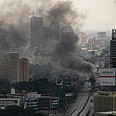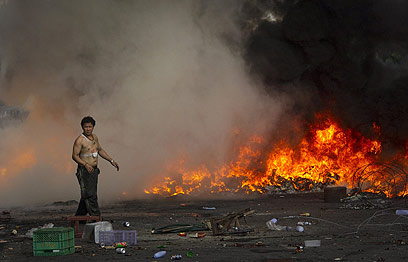
Smoke in Bangkok
צילום: AP
Thailand to impose curfew after 25 die in clashes
'We cannot let people with weapons in their hands walk around here and there,' army spokesman says. PM Vejjajiva: Best way to prevent losses is to stop the protest
Thailand will impose a curfew Sunday and send Red Cross workers to evacuate women and children from Bangkok's deadly protest zone where 25 people have been killed in four days of street battles between anti-government demonstrators and troops.
A towering column of black smoke rose over the city Sunday as protesters facing off with troops set fire to tires serving as a barricade. Elsewhere, they doused a police traffic post with gasoline and torched it as sporadic gunfire rang out.
The government said a curfew has become necessary to stop the armed members of the so-called Red Shirt protest movement. Journalists have seen some of them carrying guns, but most have used homemade fire bombs and fireworks.
"We cannot let people with weapons in their hands walk around here and there," army spokesman Col. Sansern Kaewkamnerd said.
"Terrorist groups have tried to create a situation where shots are fired at military and police officers to instigate misunderstanding among them that officers are attacking each other," he said.
The timing and the exact locations of the curfew will be announced later, he said.
The spiraling violence has raised concerns of sustained, widespread chaos in Thailand — a key US ally and Southeast Asia's most popular tourist destination that promotes its easygoing culture as the "Land of Smiles."

Scene of riots in Thailand (Photo: Reuters)
Speaking on his weekly television program, Prime Minister Abhisit Vejjajiva insisted he was left with no choice but a military operation to end the country's two-month-old crisis.
"Overall, I insist the best way to prevent losses is to stop the protest. The protest creates conditions for violence to occur. We do realize at the moment that the role of armed groups is increasing each day," he said.
The Red Shirts have occupied a 1-square-mile (3-square-kilometer) zone, barricaded by tires and bamboo spikes, in one of the capital's ritziest areas, Rajprasong, since mid-March to push their demands for Abhisit to resign immediately, dissolve Parliament and call new elections.
'Small step for soldiers'
The Red Shirts, drawn mostly from the rural and urban poor, say Abhisit's coalition government came to power through manipulation of the courts and the backing of the powerful military, and that it symbolizes a national elite indifferent to the poor.
Sansern said the government will send the Red Cross and voluntary organizations into the protest zone to "invite or persuade people, especially women, children and older people to leave the area."
On Sunday, hundreds of women and children moved to a sprawling Buddhist temple compound within the protest zone, fearing a crackdown. In Thai tradition, temples are considered safe havens where no weapons are allowed.
About 5,000 people are believed camped in the zone, down from about 10,000 before fighting started Thursday after a sniper shot and seriously wounded a Red Shirt leader, a former army general who was the Red Shirt military strategist. His condition worsened Sunday, doctors said.
After his shooting, fighting quickly spread to nearby areas, which became a no-man's land as the army set up barriers in a wider perimeter around Rajprasong. The area already resembles a curfew zone with no public transport or private vehicles. Most shops, hotels, supermarkets and businesses in the area are shut. The government has shut off power, water and food supplies to the core protest zone.
Schools were ordered shut Monday in all of Bangkok. Long lines formed at supermarkets outside the protest zone as people rushed to stock up on food.
At least 54 people have been killed and more than 1,600 wounded since the protests began mid-March, according to the government. The dead include 25 killed since Thursday.
"I'm asking Abhisit not to shoot children, women and old people. Come kill us (men) instead," said a Red Shirt leader, Jatuporn Prompan. "Once the authorities stop shooting at protesters, the death toll will stop rising."
On Saturday, soldiers blocked major roads and pinned up notices of a "Live Firing Zone" in one area of Bangkok. Demonstrators dragged away the bodies of three people from sidewalks in that area — shot by army snipers, they claimed.
The New York-based Human Rights Watch on Saturday called on the Thai government to revoke the fire zones and negotiate an end to the fighting.
"It's a small step for soldiers to think `live fire zone' means `free fire zone,' especially as violence escalates," the rights watchdog said in a statement.
The clashes are the most prolonged and deadliest bout of political violence that Thailand has faced in decades despite having a history of coups — 18 since it became a constitutional monarchy in 1932.
The crisis appeared to be near a resolution last week when Abhisit offered to hold elections in November, a year early. But the hopes were dashed after Red Shirt leaders made more demands.
The political uncertainty has spooked foreign investors and damaged the vital tourism industry, which accounts for 6 percent of the economy, Southeast Asia's second largest.
The Thai Red Cross said its blood supplies are running low and invited people to donate blood.
The Red Shirts especially despise the military, which forced Thaksin Shinawatra, the populist premier favored by the Red Shirts, from office in a 2006 coup. Two subsequent pro-Thaksin governments were disbanded by court rulings before Abhisit became prime minister.










